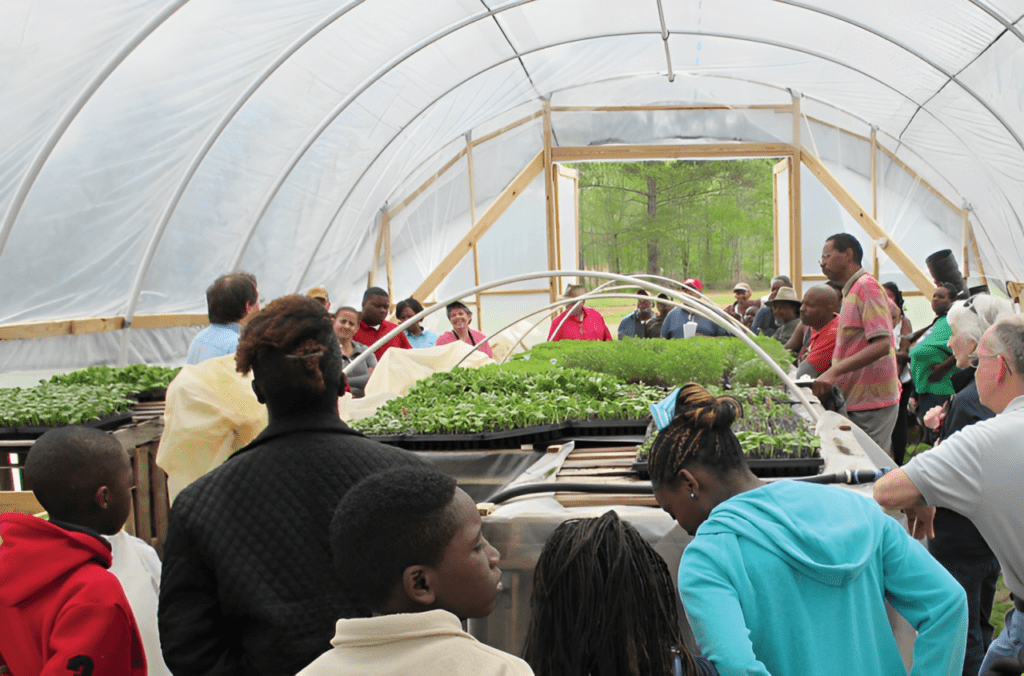The Alliance of Sustainable Farms celebrates a decade of supporting small-scale farms in Mississippi
The Alliance of Sustainable Farms has come a long way since it was featured in the June 2012 issue of Acres U.S.A. It continues to shift the agricultural landscape of Mississippi toward sustainability, with a focus on rural community preservation and revitalization.
From its beginnings in Holmes County, Mississippi, the Alliance now provides training and technical assistance statewide to small-scale, limited-resource farmers. Its newest initiative builds on the foundation of farmers supported by the Alliance over the last decade.
Where the Alliance has Been
The Alliance was started by a small group of farmers aiming to improve the quality of life in their community. Since then, it has organized more than 100 field days hosted by local farms, drawing more than 4,000 attendees.
Alliance founding director, CEO, and president Keith Benson said that in its first year, the Alliance was the largest local supplier of produce to Mississippi’s only organic grocery store and sold vegetables to multiple markets and restaurants as well as two school systems through its Farm to School program.
“After the initial USDA StrikeForce grant, we got a SARE grant, a few USDA grants, and grants through the Mississippi Department of Agriculture and Commerce,” said Benson. “Natural Resources Conservation Service, nationally and statewide, has also been a big supporter of our work over the years with funding.”
The Alliance works with Mississippi State University, Alcorn State University, and the National Center for Appropriate Technology.
On-Farm Training
Alliance field days promote the adoption of sustainable practices and center on soil health, year-round production, irrigation and water management, integrated pest and disease management, food safety, marketing, and more.
The Alliance’s 100th field day — this past April at Brewer Vegetable Farm in Greenwood, Mississippi — had more than 60 attendees, despite heavy rain.
“Before 2020, we were averaging a field day every month somewhere across the state,” said Benson. “We are getting back in the full swing now, and attendance at field days is now exceeding pre-pandemic levels.”
In February, the Alliance held a field day at Sipp Culture Community Farm in Utica, bringing in more than 70 attendees. Carlton Turner, co-founder of the Mississippi Center for Cultural Production (Sipp Culture), said the farm has 1.5 acres in production in a permanent raised row system and an 1,800-square-foot commercial greenhouse. The farm sells directly to consumers at farmers’ markets and has a program for elders, providing weekly boxes of fresh vegetables to 75 addresses.
“We are renovating a main street space into a commercial kitchen and cultural center for our farm and other local producers to have a space to process and produce value-added products and cook and serve to our local community,” said Turner. “Our mission is to create a closed-loop system, with our programs working to support each other. It’s not necessarily the traditional model because we look at the ‘culture’ in agriculture in a much broader sense.”
Galloway Family Farm and Education Center, a five-acre organic teaching farm with more than 350 fruit trees using no-till hügelkultur methods in Ocean Springs, has hosted several Alliance field days. Third-generation farmer Tracy Galloway says he aims to reach young farmers.
“The Alliance work Keith is doing is changing generations and is needed in our state of Mississippi,” said Galloway. “His networking has brought together many key assets to assist beginning and veteran farmers to move forward together in a powerful way.”
Cluster/Anchor Farm Initiative
The Alliance’s Cluster/Anchor Farm Initiative centers on groups (clusters) of three to five small-scale farms with a lead (anchor) farm for each cluster. Anchor farms serve as a source of support and stability for each cluster by conducting and helping coordinate activities crucial to the success of the cluster, such as seed starting, on-farm and mobile cooling/refrigeration, washing/packing, bulk purchasing, and equipment loan/sharing.
“This approach empowers and helps farmers address the challenges they face together,” said Benson. “The farmers collaborate and share resources and manpower. If you want to set up a certain marketing approach, a lot of small farms don’t have the resources, so I thought the best solution was for them to turn to each other — like the old days of barn raising.”
The Alliance, along with partners Happy Foods Project and Seven Harvest, made strategic investments in two farm clusters in 2022, including bulk purchasing of certified organic seeds, insecticides, and fertilizers.
Coleman’s Farm in Carroll County is one of the cluster farms supported by the Alliance’s first cluster. Owner/operator James Burch retired from the U.S. Army and decided to grow vegetables on his family’s land that had been dormant for more than 50 years because he and his wife wanted access to nutrient-dense produce.
“We are about 20 miles in any direction from any big-box stores, and fresh produce wasn’t available, so I started acquiring resources to till the land,” said Burch.
Burch’s 150-acre farm has about two acres in vegetable production (high tunnel and field). He said the cluster is currently growing lettuce, red cabbage, various peppers and tomatoes, cucumbers, zucchini, squash, and okra.

“We own our individual farms but share resources and information,” said Burch. “We are growing the same crops so that, if a vendor or market requires large-scale volume, because we are growing the same vegetables using the same sustainable methodology, they know no matter what farm it comes from it’s going to be high quality.”
The Alliance plans to keep ramping up ways to support Mississippi farmers and help them adopt sustainable practices.
For more information about the Alliance of Sustainable Farms, or to learn how to be part of the Cluster/Anchor Farm Initiative, contact Keith Benson at 601-988-4999 or allianceofsustainablefarms@gmail.com.
Tara Maxwell is a former managing editor of Acres U.S.A. magazine (2010-2019) with a passion for sustainable agriculture. She works in public health-focused communications in Texas and tackles freelance writing when she isn’t working in her community garden plot.

















